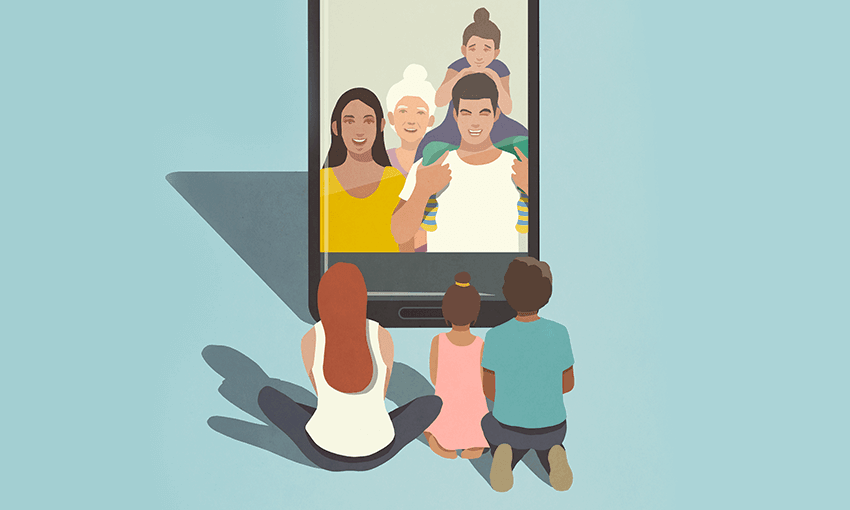How on earth did families stay in touch before the invention of the group chat? Shanti Mathias celebrates the digital glue that keeps her tribe connected.
I was a teenager, sitting on the couch at a friend’s house, painting my fingernails sparkly blue while some inane entertainment – Brooklyn 99, brothers playing on the Wii – ran in the background. My friend was showing me photos of her family, updates from her cousins in Thailand, from her aunty in Colorado, and it was all part of something called a group chat. It was 2015.
Maybe it was the Baader-Meinhof effect, maybe it was the fact that at that time smartphones were beginning to supplant email or Skype, but after that I started hearing about family chats all the time. My family and I lived in India; updates from my mum’s sisters in New Zealand percolated through a group chat they’d just formed. Other friends had Snapchat groups with their parents and siblings, or used Viber (remember Viber?) to hear from their loved ones who lived elsewhere.
A few years later, when my sister and I moved out of home, we started a group chat for our immediate family. It’s gone through various iterations on Facebook Messenger and WhatsApp in the years since, and been joined by new chat groups for both sides of the extended family, and a group just for my siblings and me.
While not every family has a group chat – and data on this is hard to find – the ubiquity of smartphones means this way of staying in touch with family is increasingly common. Many social platforms and apps are built on the promise of messaging people, from WhatsApp and Messenger to Google Chat and Discord, but family group chats stand out from the ones we have with our flatmates, friends, colleagues or potential dates, in that they involve intergenerational communication.
There can be big differences in values, lifestyles, and personalities between the generations in a family, says Craig Fowler. He should know: the associate professor at Massey University specialises in how intergenerational communication shapes decisions and identities within family groups. While he hasn’t studied family group chats specifically, he sees the phenomenon as another example of how “family communication blunts the differences between [family members], building cohesion and showing them how they fit within this unit”.
Of course, families have always communicated using the technology available to them, and the group chat is merely the latest iteration of this. “When I left home my mother expected me to sit down every Sunday and write her an aerogramme, just as she had done,” says Helen Beamish, a retired Dunedin resident with adult children. “When the letter arrived, I’m sure she’d tell everyone about what I was up to. My family group chat now is really the equivalent of the same thing.”
Fowler – who grew up not sending aerogrammes, but writing a list of things to relay to grandparents on a weekly phone call – says technology has long been a “focal point” for family life. But does the convenience of a group chat mean that families hear more from each other than they would otherwise?
Anya Kemp, a student who lives in Wellington, certainly thinks so. Her family started a Facebook Messenger group chat when she was in high school and gaining independence, but the activity within it really increased once she moved out of home a few years later. Now, her family communicates mostly in gifs and memes, “allowing the mundane or silly little updates we have throughout the day”.
Family group chats are great for logistics – airport pickups, school prize giving night, coordinating birthday presents – but they’re also lots of fun. Rose Newburn, a Dunedin mother and grandparent whose children range from age 26 to 39, has a family group chat on Slack, the platform better known for work communication. Newburn reads out some of their Slack channel names: “Christmas 2021, food, puzzles, photos, random, Rose in Wellington – that was for a visit the other week.” While the Slack group includes all of her children and their partners, she also has a separate Voxer chat with only her daughters.
“Phone calls don’t work for everyone,” she says. “I found that [online] I could sometimes have more meaningful conversations with my kids about what they care about.”
Forums like family group chats can reinforce family identities, Fowler says. Creating a group chat – and perhaps also a splinter group chat, just for some family members but not others – creates explicit boundaries about who belongs, and who knows what. There are things I’d tell my immediate family group chat, but not my extended family one; decisions that I’d discuss with my mother on a phone call but hope wouldn’t be broadcast in wider forums.
Because where there are families, there is gossip. Kemp’s family group chat might include details of drama in her parents’ workplaces, Newburn’s Slack and Voxer conversations bubble with notifications about which children are considering buying houses and where, and Beamish realised she’d been talking behind her brother’s back when she accidentally left him out of a WhatsApp chat.
But all three agree higher-stakes conversations would happen with or without their group chats. Kemp says she still likes phone calls with her parents, which allow for more substantial and private one-on-one conversations than the group chat, and allow logistical details to be sorted without the overwhelm of “notifications galore”.
“I’m a chronic over communicator,” says Beamish, who has a group chat with her siblings, as well as with her husband and three children, some of whom have muted or left the chat. She doesn’t mind: she likes the daily photos and updates, but that’s just her. “I think everyone should know everything. With WhatsApp, I can get my needs met and they don’t have to look at it.”
There tend to be gendered patterns of family communication, which extend to group chats. Anecdotally, from the five or six family group chats I’m in and conversations with others, women seem to be more active in these forums. The sociological term for this is “kinkeeping”, Fowler says. “There’s usually a middle-aged female family member who is responsible for keeping tabs on everyone, organises reunions and makes sure everyone is included. Whether that is face-to-face or digital, it still falls on the female family members to do those things,” he says.
And these patterns of communication will be preserved for the future. What would otherwise be lost to the mists of time – information relayed in person or over the phone disappearing due to forgetfulness, old letters or telegraph slips containing the salacious and the inane disintegrating in damp boxes – is instead perfectly crystallised in a group chat. If people remember their passwords and the big corporations who own these platforms continue to run their warehouses of servers stuffed, records of what people shared will remain.
Fowler, who is definitely an optimist, sees this as a good thing, imagining future generations knowing more about the people they came from. “We’ll have these amazing archives of family exchanges,” he says. “They’ll be a wonderful resource.” I ask him about the ethics of corporations holding this data, to preserve or relinquish at will. His face falls. “It was so pure, and you’ve ruined it,” he says, laughing.
Still, the group chat is an opportunity that hasn’t existed before, a consequence of the ability to share information being cheaper than ever before. Newburn, Beamish and Kemp appreciate their family chats, and intend to keep using them – and so do I.
“There are obvious barriers of inequity [and] you might have to get past your family having views you disagree with,” says Fowler. But, he adds, with group chats and everything else technology affords, it’s also “a better time to be a family communicating than ever before”.

